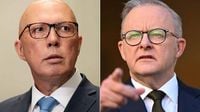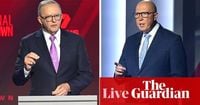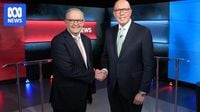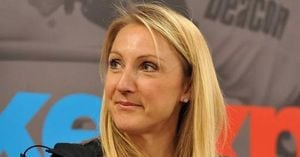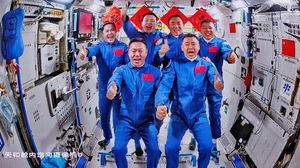In a pivotal moment for the 2025 Federal Election, Prime Minister Anthony Albanese and Opposition Leader Peter Dutton faced off in their fourth and final leaders' debate on April 27, 2025. With just days remaining until Australians head to the polls on May 3, the stakes were high as both leaders aimed to sway undecided voters and solidify their respective positions.
According to Channel 7’s panel of undecided voters, Albanese emerged victorious, capturing 50% of the votes, while Dutton received 25%, with another 25% remaining undecided. This debate, dubbed the "Final Showdown," was broadcasted live, allowing viewers to witness the candidates make their final pitches for leadership.
Throughout the evening, the leaders tackled key issues affecting Australians, particularly the cost of living, housing, and national security. Albanese, in his closing remarks, expressed optimism about Australia’s future, stating, "What gives me hope is the resilience, the courage, the optimism of the Australian people." He emphasized Labor's commitment to investing in the country, highlighting plans for cheaper medicines, childcare, and energy bill relief.
Conversely, Dutton argued that the Coalition was the better economic manager, asserting that Australians had been struggling under Albanese’s leadership. He stated, "I don’t believe Australians can afford three more years of increased costs of everything," positioning himself as the candidate for change. Dutton proposed immediate relief measures, including a 25-cent cut in fuel tax and a $1,200 tax rebate.
The debate also featured a heated exchange on energy policy. Dutton accused Albanese of potentially "wrecking the economy" with the ALP’s energy plan, while Albanese defended his government’s approach, stating that it was essential for Australia’s long-term sustainability.
In a notable moment, Dutton was pressed on whether he would acknowledge traditional owners at official events. He remarked that while he respects Indigenous culture, he believes that such acknowledgments have become "overdone" and can divide the country. Albanese countered by affirming the importance of respecting Australia’s Indigenous heritage and culture.
On the topic of housing, both leaders acknowledged the ongoing crisis, with Dutton blaming rising migration for increasing pressures on the housing market. Albanese, however, argued that the housing crisis was a long-standing issue and that his government was focused on increasing supply to address it.
As the debate progressed, the candidates also addressed security concerns, particularly regarding China. Dutton labeled China as the biggest threat to Australia’s security, while Albanese acknowledged the complexity of the relationship, noting that while China seeks to increase its influence, it is also a major trading partner.
Throughout the debate, Treasurer Jim Chalmers commented on Dutton's performance, suggesting that he "lost his cool" during the clash, which could impact voter perception. Chalmers stated, "Volatile times are the worst time for a volatile leader like Peter Dutton. Tonight, we saw Peter Dutton lose his cool." This remark echoed the sentiment that stability and certainty were crucial in uncertain times.
As the debate concluded, both leaders expressed their commitment to improving the lives of Australians. Albanese reiterated that if elected for a second term, he would continue to work towards reducing inflation and enhancing economic growth. Dutton, on the other hand, focused on the need for immediate action to alleviate the cost-of-living crisis.
With the election just days away, the debate served as a critical platform for both candidates to lay out their visions for Australia. Polls indicate that Labor leads the Coalition by 53.3% to 46.5%, with concerns over the cost of living, migration, and housing dominating voter sentiment. The outcome of this election will hinge on whether Dutton can effectively convey his message of change and economic management to the electorate.
As Australians prepare to cast their votes, the final leaders' debate highlighted the contrasting approaches of the two parties and underscored the pressing issues that will shape the future of the nation. With nearly 2.4 million Australians already participating in early voting, the final week of campaigning promises to be intense as both parties vie for support across key electorates.
